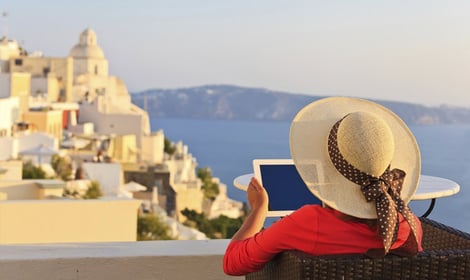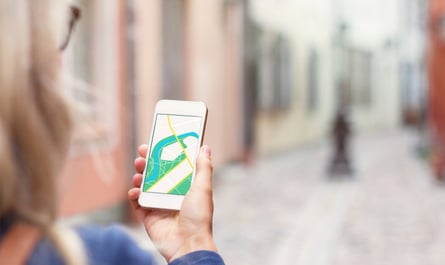Traveling in the 21st century is completely different than traveling years ago. Thanks to advancements in technology, travelers have all that they need to prepare for a trip in the palm of their hands. The days of being uninformed or getting lost seem to be coming to an end.
Here are just a few examples of how technology has changed the way people travel.
All at your fingertips
 With the invention of smartphones, everything you need to get ready for a trip is right at your fingertips. There are a number of travel apps—both for business and leisure travel—that can help ensure every trip runs smoothly from the moment you start making arrangements to the moment you arrive home. Gone are the days where you need to lug around—and desperately try not to lose—all of your travel documents, frantically look for the closest gas station because you’re running on empty or fail miserably at finding last-minute hotel reservations. Now you can store everything on your smartphone, keeping you prepared and organized.
With the invention of smartphones, everything you need to get ready for a trip is right at your fingertips. There are a number of travel apps—both for business and leisure travel—that can help ensure every trip runs smoothly from the moment you start making arrangements to the moment you arrive home. Gone are the days where you need to lug around—and desperately try not to lose—all of your travel documents, frantically look for the closest gas station because you’re running on empty or fail miserably at finding last-minute hotel reservations. Now you can store everything on your smartphone, keeping you prepared and organized.
And since you have access to the internet on your smartphone, you are able to stay updated on what’s going on in the world throughout your trip. People are constantly presented with information, whether about a specific travel supplier, location or any other news that may affect a trip. Traveling in the 21st century means staying connected to the world. Some may find this useful as they can keep up with current events while others may miss the days where they can forget about the rest of the world when on a trip.
Additionally, as a result of all your smartphone has to offer, you will find that you’ll be traveling lighter. It isn’t necessary to pack a camera, music player, travel diary, guidebook and planner anymore.
Fear of the unknown no more
Years ago, you couldn’t go online and check customer reviews in order to help you make a certain decision about a trip. This is a major example of how technology has changed the way people travel. Of course, we all know that not everything on the Internet is accurate, so this could make planning a trip more complicated since you may not be sure what to believe. However, that doesn’t mean everything is useless either.
For example, social media allows you to uncover travel information even when you’re not looking. Let’s say a friend of yours from high school, whom you haven’t spoken to in a while, posts pictures from her recent trip to Bermuda on Instagram, including the activities she participated in and the resort she stayed at. You now have a general idea of what Bermuda is like without putting in any effort.
It’s important to note, however, that when trying to find out more detailed information about a certain location, resort, airline or vacation package, talking to a travel agent is highly recommended because they are the experts and have access to the best deals.
Found, not lost
 GPS navigation devices are just another example of how technology has changed the way people travel. When you went on a trip—particularly a road trip—years ago, it was almost guaranteed that you were going to make a wrong turn somewhere, which was part of the fun to some people. Now, the chances of losing your way are much smaller.
GPS navigation devices are just another example of how technology has changed the way people travel. When you went on a trip—particularly a road trip—years ago, it was almost guaranteed that you were going to make a wrong turn somewhere, which was part of the fun to some people. Now, the chances of losing your way are much smaller.
Today, if you miss an exit or get on the wrong road, you will hear a voice telling you that it’s “re-calculating.” You most likely will not have to pull over on the side of the road and take a look at a paper map in order to figure out how to get back on track. Or ask someone for help in which you are frequently given directions that sound a lot like, “Go past the Starbucks, then past the Target. If you see a Bank of America, you went too far.”
What language barrier?
Communicating with people while traveling in the 21st century is much simpler. You don’t have to consider taking an introductory course. You don’t need to carry around a foreign language dictionary everywhere you go and attempt to formulate a coherent sentence. Having translation websites and apps available eliminates a lot of the confusion that oftentimes kept people from connecting with others during their travels in the past.
It’s a smaller world after all
Technology has made the world a smaller place. Not only are you aware of current events and travel news, technology allows you to stay connected with your loved ones back home and the people you meet during your travels once the trip is over. Having a phone with you at all times makes keeping in touch with family and friends much easier than before. Call. Text. Video chat. You may not even miss them while you are on a trip because you are able to be in constant contact with them.
Social media outlets allow you to stay in touch with people you meet while on your travel journeys as well. Rather than trying to determine that best times to call each other, which can be especially difficult if you live in different time zones, you can become “friends” with them on Facebook or “follow” them on Twitter and Instagram.
Technology allows you to you access key information, carry important documents as data, and stay in touch with the people you love all within the palm of your hand. The only question remains: How will you spend the time you didn’t lose by getting lost or butchering a foreign language?




